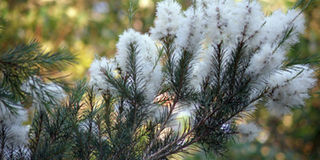Prime
Turning tea tree into a money making venture

A tea tree plant. Tee tree oil is used in making some kinds of shampoo and soap. Net photo
What you need to know:
The crop takes at least seven months to mature. The good thing about growing teat tree is that it can be harvested for a period of over 20 years without uprooting.
Benefits of tea tree oil
Tea tree oil has been tested in various skin and medical conditions including acne pimples, dermatitis, gingivitis, pediculosis (lice), dandruff, genital warts, and tinea pedis (athlete’s foot).
It also gives relief from muscular pain, aches and sprains.
A fter years of disappointment in trying to grow maize and beans with perennially poor harvests, hundreds of farmers in Laikipia, parts of Nyeri and Meru have now turned to tea tree farming.
The crop originates from Australia where it earned its name because the leaves are used in making tea masala. It is now also used to heal wounds and make cosmetics.
The farmers say the cash crop has increased their income and they have formed an organisation that consists of 505 members who are growing the plants.
Among those that have benefited from growing of this crop are old women, widows and single mothers.
Five years ago, Mary Njeri, 62, from Laikipia was the first to plant the crop whose oil is used to make cosmetic products. Ms Njeri says that she had tried growing maize, beans and millet but none gave her good harvest. Ms Njeri who sourced her seedlings from Naivasha says tea trees require little attention unlike other crops.
“I am currently farming my crop in a quarter an acre of land, but already I have started adding more on another half an acre,” she says. From the quarter an acre, Ms Njeri says she earns Ksh15,000 to Ksh20,000 after every harvest and this is good money to keep her going.
She is now encouraging other women to grow the crop which she says requires little attention, but gives more money. After weeding twice, the crop is left to grow until it reaches the appropriate height of harvesting which is two feet. The crop takes at least seven months to mature.
The high returns are also luring livestock farmers into growing the tree trees with most seeking funds from microfinance institutions. Johnson Kithendu, CEO Milango Microfinance, said the firm has given money to more than 500 farmers to grow tea trees.
Mr Kithendu said the firm’s aim is to fight poverty and that is why it is targeting women from semi-arid regions. The other advantage of growing tea-tree is that it can be harvested for a period of 20 years without uprooting.
Tea trees grow in tropical regions; that is areas that experience hot days and very cold nights. The crop according to Gibson Wahome, the chairman of Kenya Organic Oil Farmers grows well and don’t require a lot of water making Laikipia, Meru and Nyeri the most favourable.
Mr Wahome says that in a quarter an acre, one can be able to harvest four tonnes per every harvest. However, this depends on crop management.
“Many farmers from Meru and sections of Nyeri have managed to harvest more than four tonnes. This because their soil is fertile and their ground is not that dry,” said Mr Wahome.




